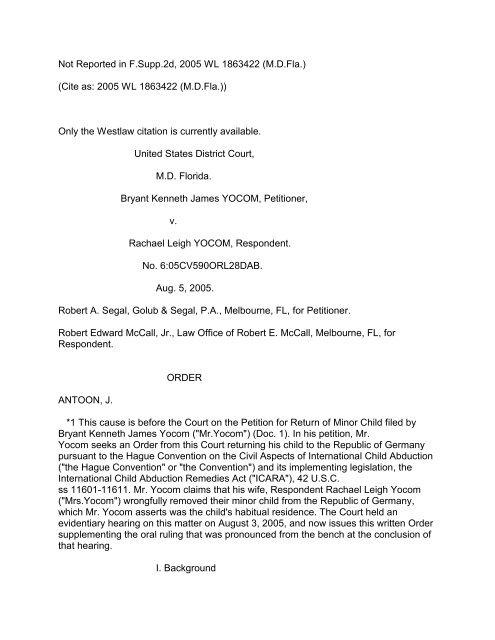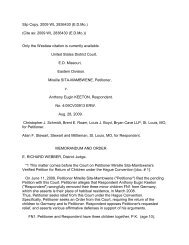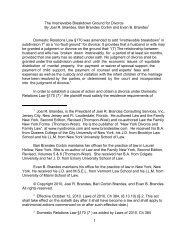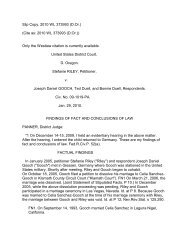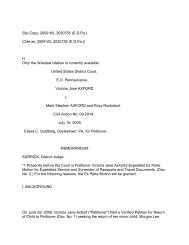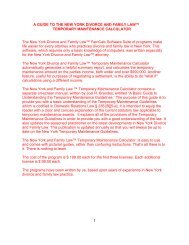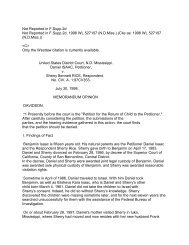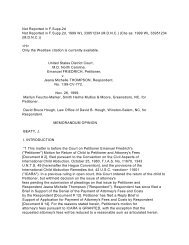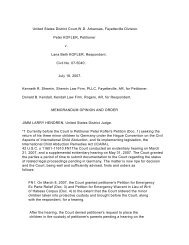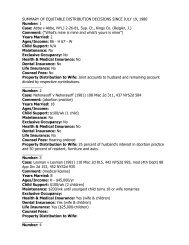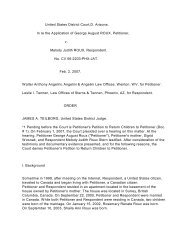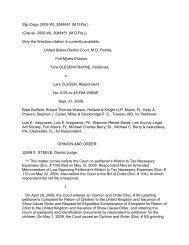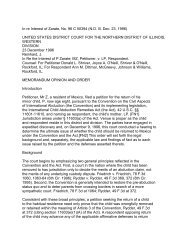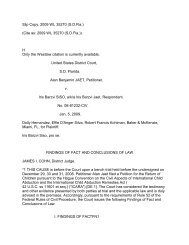ocom v Yocom
ocom v Yocom
ocom v Yocom
You also want an ePaper? Increase the reach of your titles
YUMPU automatically turns print PDFs into web optimized ePapers that Google loves.
Not Reported in F.Supp.2d, 2005 WL 1863422 (M.D.Fla.)<br />
(Cite as: 2005 WL 1863422 (M.D.Fla.))<br />
Only the Westlaw citation is currently available.<br />
United States District Court,<br />
M.D. Florida.<br />
Bryant Kenneth James YOCOM, Petitioner,<br />
v.<br />
Rachael Leigh YOCOM, Respondent.<br />
No. 6:05CV590ORL28DAB.<br />
Aug. 5, 2005.<br />
Robert A. Segal, Golub & Segal, P.A., Melbourne, FL, for Petitioner.<br />
Robert Edward McCall, Jr., Law Office of Robert E. McCall, Melbourne, FL, for<br />
Respondent.<br />
ANTOON, J.<br />
ORDER<br />
*1 This cause is before the Court on the Petition for Return of Minor Child filed by<br />
Bryant Kenneth James Y<strong>ocom</strong> ("Mr.Y<strong>ocom</strong>") (Doc. 1). In his petition, Mr.<br />
Y<strong>ocom</strong> seeks an Order from this Court returning his child to the Republic of Germany<br />
pursuant to the Hague Convention on the Civil Aspects of International Child Abduction<br />
("the Hague Convention" or "the Convention") and its implementing legislation, the<br />
International Child Abduction Remedies Act ("ICARA"), 42 U.S.C.<br />
ss 11601-11611. Mr. Y<strong>ocom</strong> claims that his wife, Respondent Rachael Leigh Y<strong>ocom</strong><br />
("Mrs.Y<strong>ocom</strong>") wrongfully removed their minor child from the Republic of Germany,<br />
which Mr. Y<strong>ocom</strong> asserts was the child's habitual residence. The Court held an<br />
evidentiary hearing on this matter on August 3, 2005, and now issues this written Order<br />
supplementing the oral ruling that was pronounced from the bench at the conclusion of<br />
that hearing.<br />
I. Background
The parties were married on August 27, 2003, in Brevard County, Florida. They have<br />
one child together, a son named Gabriel, who was born on January 9, 2004, while the<br />
parties were residing in Titusville, Florida. Mr. Y<strong>ocom</strong> is currently twenty-three years old<br />
and Mrs. Y<strong>ocom</strong> is twenty.<br />
On December 29, 2003-four months after the parties were married and ten days<br />
before Gabriel was born-Mr. Y<strong>ocom</strong> enlisted in the United States Air Force for a fouryear<br />
term. Mrs. Y<strong>ocom</strong> testified that she did not want Mr. Y<strong>ocom</strong> to join the military, but<br />
she stated that it was really the "only choice" to enable her to stay home with their<br />
baby. When Mr. Y<strong>ocom</strong> enlisted, the parties were not sure whether Mr. Y<strong>ocom</strong> would<br />
stay in the Air Force beyond four years of active duty and two years of inactive duty,<br />
although Mr. Y<strong>ocom</strong> is considering a career in the military.<br />
Mr. Y<strong>ocom</strong> attended basic training for seven weeks in San Antonio, Texas,<br />
completing that training on February 13, 2004. While Mr. Y<strong>ocom</strong> was in basic training in<br />
Texas, Mrs. Y<strong>ocom</strong> and Gabriel did not live with him but remained in Florida.<br />
Immediately upon completion of basic training, Mr. Y<strong>ocom</strong> moved to Biloxi,<br />
Mississippi to attend Air Force technical school for twelve weeks. In early March 2004,<br />
shortly after that twelve-week period began, Mrs. Y<strong>ocom</strong> and Gabriel moved to<br />
Mississippi to live with Mr. Y<strong>ocom</strong>. At that time, Mrs. Y<strong>ocom</strong> sold a television, a stereo,<br />
an entertainment center, and other of her personal items. Mr. Y<strong>ocom</strong> explained that his<br />
wife did that because those items would just be an encumbrance when they moved.<br />
Mrs. Y<strong>ocom</strong> did not own any real property or a car, and she testified that she "left [her]<br />
residence behind" and drove her belongings to Mississippi in a U-Haul.<br />
While Mr. Y<strong>ocom</strong> was attending technical school in Mississippi, he received orders<br />
that his first duty station would be at Ramstein Air Base in Ramstein, Germany. (See<br />
Pet'r's Ex. 1). The family moved to Germany on June 11, 2004, traveling together. Mrs.<br />
Y<strong>ocom</strong> and Gabriel are listed as dependents on Mr. Y<strong>ocom</strong>'s change-of-station orders,<br />
(Pet'r's Ex. 1), and were "command sponsored," meaning that they were acknowledged<br />
to be Mr. Y<strong>ocom</strong>'s dependents living overseas. The family's belongings, which had<br />
previously been moved from Florida to Mississippi, were transported to Germany by the<br />
Traffic Management Office at the government's expense. The child was five months old<br />
at that time.<br />
*2 When the family moved to Germany, Mr. Y<strong>ocom</strong> owned a mobile home in Cocoa,<br />
Florida, on which his mother was the deedholder. There is a mortgage on that mobile<br />
home, and once Mrs. Y<strong>ocom</strong> and Gabriel moved out of the mobile home to join Mr.<br />
Y<strong>ocom</strong> in Mississippi in March 2004, Mr. Y<strong>ocom</strong>'s best friend began residing in the<br />
mobile home and making the mortgage payments. Mr. Y<strong>ocom</strong> explained at the hearing<br />
that it did not make sense to keep making payments on a home that they were not<br />
going to be living in, and Mr. Y<strong>ocom</strong> has made an agreement with the best friend that<br />
the best friend will assume the mortgage and acquire the deed. Mr.<br />
Y<strong>ocom</strong> left behind a motorcycle in Florida that remains at his father's house in Titusville.<br />
The parties also had a car when they were in Florida but it was totalled shortly before
they went to Germany. That car was not replaced while the family was still in the United<br />
States, but a car was purchased once they arrived in Germany.<br />
Mr. Y<strong>ocom</strong>'s orders were that he was to be in Germany for thirty-six months, with a<br />
trailing six months after that during which he would not be moved to another<br />
assignment. Before the family moved to Germany, Mr. Y<strong>ocom</strong> advised Mrs.<br />
Y<strong>ocom</strong> of the length of the assignment and that it was not possible for it to be modified.<br />
Mrs. Y<strong>ocom</strong> testified that she knew Mr. Y<strong>ocom</strong> would be unable to leave Germany until<br />
his tour of duty there was over.<br />
Before the family moved to Germany, Mr. and Mrs. Y<strong>ocom</strong> discussed what Mrs.<br />
Y<strong>ocom</strong> planned to do in Germany. Both parties testified that Mrs. Y<strong>ocom</strong> intended to<br />
start a daycare center in their home.FN1 Mrs. Y<strong>ocom</strong> explained that she wanted to do<br />
so in order that Gabriel could play with other children his age. Additionally, before the<br />
family moved to Germany Mrs. Y<strong>ocom</strong> had discussed with others the intention that she<br />
and Mr. Y<strong>ocom</strong> become fluent in German and teach it to Gabriel; she did not know how<br />
long it would take to learn German but acknowledged that it would require more than<br />
just a couple of months.<br />
FN1. Mrs. Y<strong>ocom</strong> did not ever open a daycare center in the home; she<br />
explained that "within weeks," the parties had begun arguing too much for<br />
her to pursue that.<br />
The parties did not live on the Air Force base in Germany but instead lived in the town<br />
of Ramstein Village in an apartment which made up one floor of a three-story building.<br />
They were acquainted with their neighbors-some of whom were German nationals and<br />
others who were fellow American military families-and considered them friends. The<br />
Y<strong>ocom</strong>s barbecued and socialized with them many times, and on occasion the German<br />
neighbors babysat Gabriel.<br />
Mr. and Mrs. Y<strong>ocom</strong> divided the responsibilities of taking care of Gabriel. Mrs.<br />
Y<strong>ocom</strong> cared for the child while Mr. Y<strong>ocom</strong> was at work, and when Mr. Y<strong>ocom</strong> came<br />
home, Mr. Y<strong>ocom</strong> attended to Gabriel. Mrs. Y<strong>ocom</strong> testified that they were equal<br />
parents and that Mr. Y<strong>ocom</strong> is a good father. Gabriel did not attend daycare or school<br />
in Germany because he was too young, and he was also too young to acquire friends.<br />
Unfortunately, within months after they arrived in Germany the parties'<br />
marriage deteriorated. Mr. and Mrs. Y<strong>ocom</strong> worked on their relationship by attending<br />
marriage counseling and making an effort to spend time with one another.<br />
However, matters did not improve. Sometime prior to November 2004, Mrs. Y<strong>ocom</strong> told<br />
Mr. Y<strong>ocom</strong> that she was not happy in Germany, and she expressed a desire to return<br />
to the United States. In November 2004, Mrs. Y<strong>ocom</strong> came to Florida for a two-week<br />
vacation with Gabriel. She did not indicate that she was coming to the United States for<br />
the purpose of relocating here; she and Mr. Y<strong>ocom</strong> discussed that before she left, and<br />
she assured Mr. Y<strong>ocom</strong> that she would return to Germany with Gabriel.<br />
Indeed, she did so.
*3 The parties continued to have problems in their relationship. They had frequent<br />
disagreements, and when they did Mrs. Y<strong>ocom</strong> asked Mr. Y<strong>ocom</strong> to leave the home;<br />
Mr. Y<strong>ocom</strong>, however, was unwilling to leave the apartment and suggested that he<br />
merely go into a different room of the home. On at least one occasion Mrs.<br />
Y<strong>ocom</strong> called the police and eventually Mr. Y<strong>ocom</strong>'s first sergeant came to the home<br />
and suggested that the parties work out some sort of agreement to govern their<br />
disputes. That night Mrs. Y<strong>ocom</strong> stayed in a hotel and agreed to stay with Gabriel the<br />
next day when Mr. Y<strong>ocom</strong> went to work.<br />
However, Mr. Y<strong>ocom</strong> took Gabriel to work with him the next day before Mrs. Y<strong>ocom</strong><br />
came to the apartment. While at the base, Mr. Y<strong>ocom</strong> typed up an agreement<br />
describing who would care for the child and where each party would sleep within the<br />
apartment. (Pet'r's Ex. 2). The agreement specifically stated that Mrs. Y<strong>ocom</strong> "agrees<br />
that she will not leave the country with Gabriel." (Pet'r's Ex. 2 at 3).<br />
Mrs. Y<strong>ocom</strong> went to that base that day-January 24, 2005-and the parties signed this<br />
agreement in front of an Air Force notary. However, Mrs. Y<strong>ocom</strong> made a notation<br />
under her signature which reads: "The only reason I agreed to sign this document was<br />
due to Bryant and his supervisors stating I would not get Gabriel unless I signed."<br />
(Pet'r's Ex. 2 at 3). However, Mr. Y<strong>ocom</strong> testified that Mrs.<br />
Y<strong>ocom</strong> had not indicated any problem with the document after she had reviewed it in<br />
the first sergeant's office, adding this notation only after the parties had traveled across<br />
the base to the notary's office to execute it. At the hearing, Mrs. Y<strong>ocom</strong> acknowledged<br />
the provision in the agreement prohibiting her from leaving Germany with Gabriel, but<br />
she testified that she does not feel that she was bound by that agreement because she<br />
was forced to sign it. She explained that she signed it only so that she could get Gabriel<br />
back.<br />
Mrs. Y<strong>ocom</strong> asked that she be permitted to take Gabriel to stay with her in her hotel<br />
room that night since she had already paid for the room, with Gabriel to be returned to<br />
Mr. Y<strong>ocom</strong> after Mr. Y<strong>ocom</strong> finished work the next day. Mr. Y<strong>ocom</strong> agreed to this<br />
arrangement, and Mrs. Y<strong>ocom</strong> took Gabriel with her to the hotel that evening.<br />
The next day, January 25, 2005, Mr. Y<strong>ocom</strong> went home from work and found that<br />
boxes had been emptied, things had been packed up, and Mrs. Y<strong>ocom</strong> and Gabriel<br />
were gone. Mr. Y<strong>ocom</strong> called his mother-in-law, who told him that Mrs. Y<strong>ocom</strong> and<br />
Gabriel were already on an airplane headed to Florida. Within a day or two, Mr. Y<strong>ocom</strong><br />
spoke to Mrs. Y<strong>ocom</strong>, who indicated that she had left because she did not want to be<br />
there and was going to do whatever she wanted to do. Mr. Y<strong>ocom</strong> had not consented<br />
to Mrs. Y<strong>ocom</strong> leaving Germany with Gabriel; the only time that he had agreed to allow<br />
her to do so was for the two-week vacation to Florida in November 2004.<br />
On January 27, 2005-two days after leaving Germany-Mrs. Y<strong>ocom</strong> filed a petition for<br />
dissolution of marriage in circuit court in Brevard County, Florida. (Pet'r's Ex. 4). Mr.<br />
Y<strong>ocom</strong> consulted an attorney in Germany and instituted proceedings in a German<br />
court. On April 4, 2005, the Zweibrucken District Court in Zweibrucken, Germany issued
an order declaring that Mrs. Y<strong>ocom</strong>'s removal of the child from Germany was unlawful<br />
under German law and the Hague Convention. (Pet'r's Exs. 3 and 3-A).FN2 The<br />
German order notes that "[a]s the child was transferred without the knowledge and<br />
consent of his father, the father's right to the custody of the child has been violated."<br />
(Pet'r's Ex. 3 at 2).<br />
FN2. The order of the German court was submitted as an exhibit both in<br />
German (Pet'r's Ex. 3-A) and as a certified English translation (Pet'r's Ex.<br />
3). Mrs. Y<strong>ocom</strong>'s attorney initially objected to the authenticity of the<br />
translation, but he withdrew his objection after the Court offered to abate<br />
the hearing while a German translator was obtained.<br />
*4 Mr. Y<strong>ocom</strong> filed his ICARA petition in this Court on April 20, 2005. (Doc.<br />
1). Shortly before the August 3 hearing on that petition, Mrs. Y<strong>ocom</strong> dismissed the<br />
divorce proceedings in Brevard County circuit court. Mr. Y<strong>ocom</strong> testified that Mrs.<br />
Y<strong>ocom</strong> told him she was dropping the divorce action because she was going to return<br />
to Germany and wanted to reconcile with Mr. Y<strong>ocom</strong>. It is undisputed that during the<br />
pendency of this petition, the parties had discussions, as recently as June 15, regarding<br />
Mrs. Y<strong>ocom</strong> possibly returning to Germany. Mrs. Y<strong>ocom</strong> testified that the parties<br />
discussed her returning to Germany on condition that all of the lawsuits filed by both of<br />
them would be dropped. However, Mrs. Y<strong>ocom</strong> found out about the German court<br />
order and felt that the German court had already ordered that Mr. Y<strong>ocom</strong> have custody<br />
of Gabriel, and she did not go back to Germany because of that order.<br />
In the just over six months that Mrs. Y<strong>ocom</strong> has been back in Florida, she has lived<br />
at four different residences. She lived with her mother for a week and then moved to an<br />
apartment for several months. She then lived in a studio apartment in a hotel for two<br />
weeks. For the six weeks prior to the hearing, she has been living in the apartment of a<br />
family friend. Mrs. Y<strong>ocom</strong> got a job soon after she arrived in Florida, but she had<br />
stopped working a few weeks before the hearing.<br />
II. Discussion<br />
Congress enacted ICARA in 1988 to implement the Hague Convention, to which both<br />
the United States and Germany are signatories. "The Convention's stated purpose is 'to<br />
protect children internationally from the harmful effects of their wrongful removal or<br />
retention and to establish procedures to ensure their prompt return to the State of their<br />
habitual residence, as well as to secure protection for rights of access." ' Leslie v.<br />
Noble, No. 05-80263-Civ-Hurley, 2005 WL 1706925, at *3 (S.D.Fla. June 30, 2005)<br />
(quoting Convention Preamble, 51 Fed.Reg. at 10,498).<br />
As this Court reminded the parties at the hearing, the Hague Convention "does not<br />
provide for a determination of custody rights or the merits of a custody dispute," but its<br />
"underlying premise is that the child's country of habitual residence is the proper forum<br />
with jurisdiction to issue custody orders."<br />
Leslie, 2005 WL 1706925, at *4. Thus, this Court's task is not to resolve the question of
custody but only to address the issue of whether Gabriel was wrongfully removed from<br />
Germany.<br />
In order to prevail, an ICARA petitioner must "establish by a preponderance of the<br />
evidence ... that the child has been wrongfully removed or retained within the meaning<br />
of the Convention." 42 U.S.C. s 11603(e)(1)(A). The Convention provides that removal<br />
or retention of a child is "wrongful" if: (1) "it is in breach of rights of custody attributed to<br />
a person, an institution, or any other body, either jointly or alone, under the law of the<br />
State in which the child was habitually resident immediately before the removal or<br />
retention"; and (2) "at the time of removal or retention those rights were actually<br />
exercised, either jointly or alone, or would have been so exercised but for the removal<br />
or retention." Hague Convention, art. 3.<br />
*5 Thus, Mr. Y<strong>ocom</strong> must show by a preponderance of the evidence: (1) that Gabriel<br />
was "habitually resident" in Germany at the time Mrs. Y<strong>ocom</strong> removed him to Florida;<br />
(2) that such removal was in violation of Mr. Y<strong>ocom</strong>'s custody rights under German law;<br />
and (3) that Mr. Y<strong>ocom</strong> had been exercising those rights at the time of the removal.<br />
See Ruiz v. Tenorio, 392 F.3d 1247, 1251 (11th Cir.2004) (citing the Convention). The<br />
critical issue in this case is where Gabriel was "habitually resident" at the time of his<br />
removal from Germany. Mr. Y<strong>ocom</strong> asserts that Gabriel's habitual residence was<br />
Germany, but Mrs. Y<strong>ocom</strong> maintains that his habitual residence was Florida and that<br />
thus his removal was not wrongful.<br />
Neither the Hague Convention nor ICARA defines "habitually resident." Thus, as<br />
many courts have noted, the issue of habitual residence must be determined based on<br />
the facts and circumstances of each case. Ruiz, 392 F.3d at 1252 (discussing cases<br />
from the United Kingdom). In Ruiz, the Eleventh Circuit endorsed the approach adopted<br />
by the Ninth Circuit in Mozes v. Mozes, 239 F.3d 1067 (9th Cir.2001), for deciding the<br />
issue of habitual residence. 392 F.3d at 1252-53.<br />
Under this approach, "[t]he first step toward acquiring a new habitual residence is<br />
forming a settled intention to abandon the one left behind." Id. at 1252. The issue of<br />
whether there was such a settled intention is a question of fact, and "[t]his settled<br />
intention is crucial because there can be no bright line rule with respect to the length of<br />
the absence." Id. at 1253. The relevant intention "is that of the person or persons<br />
entitled to fix the place of the child's residence."<br />
Id. (internal quotations omitted).<br />
In addition to a settled intention, generally "there must be an actual change in<br />
geography and the passage of a sufficient length of time for the child to have become<br />
acclimatized." Id. at 1253. However, it has been noted that in the case of a very young<br />
child like Gabriel, "acclimatization is not nearly as important as the settled purpose and<br />
shared intent of the child's parents in choosing a particular habitual residence." Whiting<br />
v. Krassner, 391 F.3d 540, 550 (3d Cir.2004). Indeed, one court has commented that<br />
where a conflict develops between parents around the time of the child's birth, it is<br />
possible that "no habitual
esidence [of the child] may ever come into existence." Delvoye v. Lee, 329 F.3d<br />
330, 333 (3d Cir.2003).<br />
The Court finds that Gabriel was habitually resident in Germany when he was<br />
removed by Mrs. Y<strong>ocom</strong> on January 25, 2005. At that time, he was barely one year old.<br />
Gabriel was born in Florida but resided in Florida for only two months before moving<br />
with his mother in March 2004 to live with his father in Mississippi. When the parties<br />
moved to Mississippi, they had a settled intention to abandon their residence in Florida,<br />
and thus, to the extent that Gabriel ever had a habitual residence in Florida by virtue of<br />
spending the first two months of his life here, it, too, was abandoned.<br />
*6 There is abundant evidence of the parties' intention to abandon their residence in<br />
Florida. As Mrs. Y<strong>ocom</strong> acknowledged at the hearing, she sold her television, stereo,<br />
and other personal belongings and "left [her] residence behind," driving to Mississippi,<br />
with Gabriel and her belongings in tow.<br />
Additionally, Mrs. Y<strong>ocom</strong>'s itinerant lifestyle since her return to Florida-including<br />
apparent difficulties in finding a settled place to live and four different residences in a<br />
span of just over six months-supports the conclusion that she had abandoned her prior<br />
residence here.<br />
From Mississippi, the family moved to Germany, having their belongings shipped from<br />
Mississippi to Germany by the government. Although Mrs. Y<strong>ocom</strong> expressed concerns<br />
about Mr. Y<strong>ocom</strong> joining the military in the first instance, it is clear that the parties<br />
agreed to go to Germany to live for the 42 months that Mr. Y<strong>ocom</strong> was assigned there,<br />
and they intended for Germany to be their place of residence for at least that period of<br />
time. They established their-and Gabriel's-habitual residence there. Before he was<br />
removed from Germany by his mother, Gabriel had spent seven months in Germanymore<br />
time than he had spent anywhere else in his short life. Thus, although there was<br />
but a brief time for "acclimatization," he was at least as much, if not more, acclimatized<br />
to Germany than he was to any other location.<br />
Mrs. Y<strong>ocom</strong> relies heavily on the Ninth Circuit's decision in Holder v. Holder,<br />
392 F.3d 1009 (9th Cir.2004), in which the court found that a military family did not<br />
abandon its habitual residence in California when it moved to Germany to live on an<br />
American Air Force Base to which the father had been ordered. Although there are<br />
similarities between this case and Holder, as noted by Mr. Y<strong>ocom</strong>'s attorney at the<br />
hearing in this case there also are distinctions.<br />
Moreover, even the Holder court "emphasize[d] that courts must consider the unique<br />
circumstances of each case when inquiring into a child's residence" and that "no per se<br />
rule dictates that children of U.S. military personnel remain habitually resident in the<br />
United States when joining their parents at overseas posts." 392 F.3d at 1016. The<br />
Holder court noted that "fact patterns vary considerably within the limited universe of<br />
Convention cases involving military personnel." Id. For example, in a case discussed in<br />
Holder, the child of a female Army sergeant and her husband, also an American citizen,
was found by a district court to be habitually resident in Germany, and that<br />
determination was not challenged on appeal. Shealy v. Shealy, 295 F.3d 1117 (10th<br />
Cir.2002), noted in Holder, 392 F.3d at 1016. In Shealy, the mother was assigned to a<br />
three-year tour of duty in Germany the year after the child was born, and pursuant to<br />
that assignment the family moved to Germany on a command sponsorship and lived on<br />
the Army base. 295 F.3d at 1119. After surveying other cases in addition to Shealy,<br />
the Holder court reiterated: "These cases underscore that military families do not<br />
generate a typical fact pattern and, in all Convention cases, emphasis is on the details<br />
of the case at hand." 392 F.3d at 1016.<br />
*7 As stated earlier, "the details of the case at hand" persuade this Court that the<br />
parties had abandoned their residence in Florida and had established Gabriel's habitual<br />
residence in Germany by the time Mrs. Y<strong>ocom</strong> removed him from Germany on January<br />
25, 2005. The Court further finds that Mrs. Y<strong>ocom</strong> decided to return to Florida based<br />
solely on her intent to gain an advantage in the developing domestic dispute between<br />
the parties.<br />
Having determined that Gabriel was habitually resident in Germany at the time he<br />
was removed to the United States, the Court turns to the other two elements that Mr.<br />
Y<strong>ocom</strong> must establish: that the removal of Gabriel was in breach of Mr.<br />
Y<strong>ocom</strong>'s custody rights under German law, and that Mr. Y<strong>ocom</strong> had been exercising<br />
those rights at the time that Gabriel was removed. These requirements clearly have<br />
been met. As recognized by the German court in its Order, Mrs. Y<strong>ocom</strong> wrongfully<br />
removed the child by violating Mr. Y<strong>ocom</strong>'s custody rights. And, lastly, the testimony of<br />
both parties made clear that Mr. Y<strong>ocom</strong> unquestionably was exercising those rights at<br />
the time that Gabriel was removed. Mr. Y<strong>ocom</strong> has thus established all of the required<br />
elements by a preponderance of the evidence,FN3 and his ICARA petition is granted.<br />
FN3. Once the petitioner meets his burden, the child must be promptly<br />
returned unless the respondent pleads, and proves, an exception under the<br />
Convention is applicable. See Leslie, 2005 WL 1706925, at *4 (describing<br />
the burdens and exceptions). Mrs. Y<strong>ocom</strong> has not asserted or presented<br />
evidence of any of the exceptions.<br />
III. Conclusion<br />
In accordance with the foregoing, it is ORDERED and ADJUDGED as follows:<br />
1. The Petition for Return of Child (Doc. 1) is GRANTED.<br />
2. On Friday, August 5, 2005, at 12:00 noon, Mrs. Y<strong>ocom</strong> shall deliver the child,<br />
Gabriel Y<strong>ocom</strong>, along with the child's passport, clothes, and personal effects, to Mr.<br />
Y<strong>ocom</strong>. This delivery shall take place at the office of the United States Marshal in the<br />
George C. Young United States Courthouse and Federal Building, 80 North Hughey<br />
Avenue, Orlando, Florida.
3. Mr. Y<strong>ocom</strong> shall return to Germany with the child within 72 hours thereafter, and<br />
he shall advise the German court immediately upon his return that the child is back in<br />
Germany.<br />
4. Mr. Y<strong>ocom</strong> shall not interfere with Mrs. Y<strong>ocom</strong>'s return to Germany, should she<br />
wish to return. As her military sponsor, Mr. Y<strong>ocom</strong> shall make all reasonable efforts to<br />
provide her with access to military facilities to which she is entitled by virtue of her<br />
status as a military dependent.<br />
5. The Court reserves jurisdiction to award fees and costs.<br />
6. The Clerk shall close this file.<br />
DONE and ORDERED in Orlando, Florida, this 4th day of August, 2005.<br />
M.D.Fla.,2005.<br />
Y<strong>ocom</strong> v. Y<strong>ocom</strong><br />
Not Reported in F.Supp.2d, 2005 WL 1863422 (M.D.Fla.)


